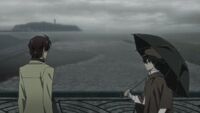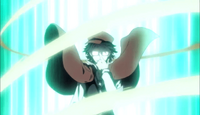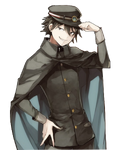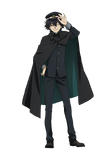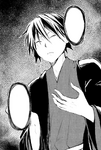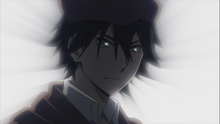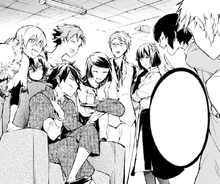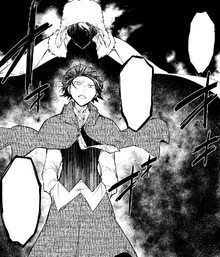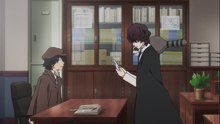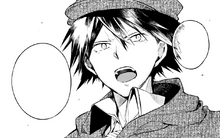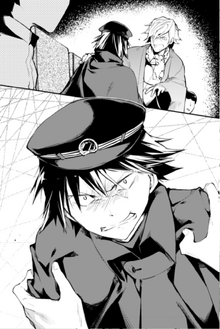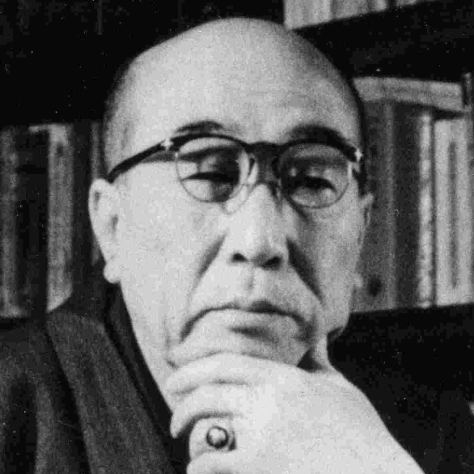Великий из бродячих псов. Как правильно РаМпо Эдогава или РаНпо Эдогава

8
0
10 votes · Voting has ended
Likes (8)
Like 8
Comment

Into Аниме Amino?
Join the community.
Get Amino
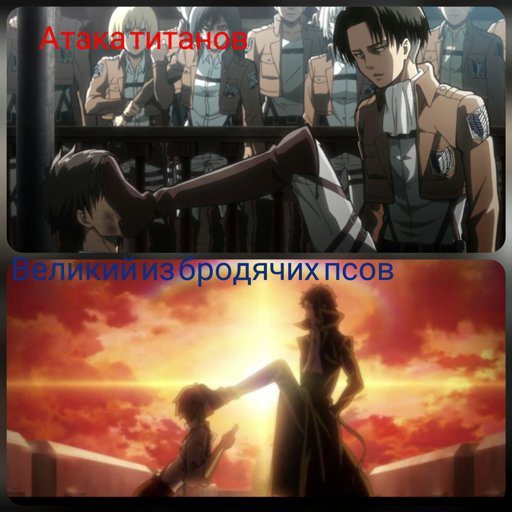



Into Аниме Amino?
Join the community.
Get App

More from Levi-Rivale (s)
06/29/20


More featured posts
итоги | Сердца за Любовь №1
4 days ago
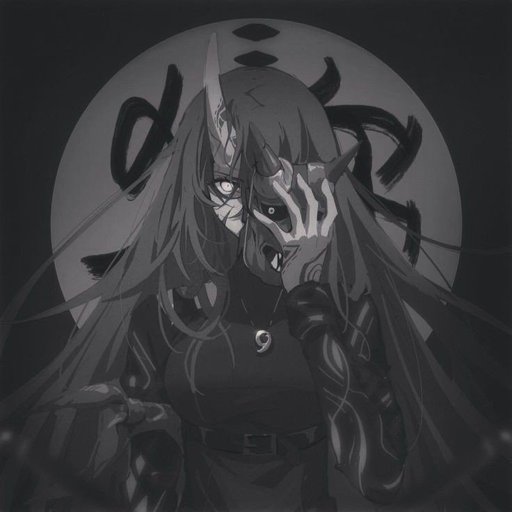

More featured posts
Тайный союз | Quiz
6 days ago

| “ | Всё хорошо, что одобрено мной! | ” |
— Девиз по жизни Эдогавы Ранпо
Ранпо Эдогава (江戸川 乱歩 Rampo Edogawa?) ― детектив, способный моментально разрешить любую загадку, объясняющий это наличием у себя сверхъестественных способностей. Однако, на самом деле, он не обладает особыми способностями, а его блестящие расследования объясняются лишь его гениальным умом.
Внешность
Рост Ранпо 168 сантиметров, что является ниже среднего уровня. Это даёт другим такое впечатление, будто он моложе, чем он есть на самом деле, особенно из-за его характера.
Ранпо надевает коричневую шляпу на свои короткие чёрные волосы, которые, судя по виду, были обрезаны без использования зеркала. Его глаза имеют зелёный оттенок и необычную, узкую форму. На плечах Ранпо носит коричневый пончо, который соответствует по цвету его шляпе и брюкам. Под ним он носит темно-серый пиджак, белую рубашку и темно-синий полосатый галстук.
Под брюками он носит длинные белые носки длиной три четверти, которые прикрывают открытые части ног, и простые, чёрные туфли.
Создаётся впечатление, что он одет как Шерлок Холмс, так как некоторые части его костюма совпадают.
Личность
Благодаря тому, что он является гением, Ранпо очень гордится собой и часто хвастается тем, что он — Величайший детектив в мире. Он также показал свой довольно детский характер в эпизоде 5, когда дразнил других членов агентства. Тем не менее, он может стать невозмутимым и расчётливым, если ситуация требует этого. Он невероятно умён, и это высоко ценится агентством, даже в большей степени от того, что у него нет способности.
Он никогда никого не слушает, занимается исключительно теми делами, что вызывают у него интерес, запросто обзывает всех (в том числе первых встречных) «глупцами» и «болванами» и имеет привычку снисходительно хлопать людей по голове, абсолютно не принимая во внимание статус человека.
Несмотря на все свои недостатки, Ранпо известен тем, что для него не существует дела, которое он бы не смог распутать. Именно на нём стоит все Вооруженное детективное агентство.
Также, как было показано в 5 эпизоде, Ранпо не в состоянии выполнить простые задачи, такие как езда на поезде.
Прошлое
Книга 3: Нерасказанная история детективного агентства
Родителями Ранпо были детектив, известный как Ясновидец, и прославившийся своими дедуктивными способностями, и домохозяйка, которая, по словам Ранпо, была даже умнее. Однако, оба они умерли, когда Ранпо было 14 лет, оставив его сиротой.
В один момент Ранпо, искавший место работы, попал на место убийства. Жертва убийства была клиентом Юкичи Фукудзавы, который работал в качестве телохранителя. Ранпо с легкостью определил убийцу, в результате чего Фукудзава задолжал ему услугу.
Несмотря на то, что Юкичи не хотел связываться с Ранпо, он всё же не желал просто так оставить его. Эдогаве, чей взгляд на жизнь был разрушен из-за страха быть неправильно понятым в связи с его невероятными возможностями, было сказано, что он — эспер. Это успокоило его, что объясняет, почему он так привязан к мысли, что его необыкновенные интеллектуальные навыки считаются способностью.
После этого Ранпо продолжил отслеживать преступника и сам был похищен. Однако, прежде чем с ним случилось несчастье, он был спасен Фукудзавой. Юкичи понял, что теперь юный гений в постоянной опасности и его способность станет мишенью для многих.
Ради Ранпо Фукудзава создал Вооруженное детективное агентство, где эсперы могут свободно использовать свои способности, не опасаясь за свою жизнь. Эсперы агентства обеспечат боевую мощь, в то время как интеллект Ранпо обеспечит средства по расследованию преступной деятельности, и, таким образом, агентство сможет работать.
Книга 2: Дазай Осаму и Тёмная Эра
Встреча Ранпо и Оды.
Однажды Ранпо случайно сталкивается с Одой Сакуноске на мосту, когда он спешно относит детективные инструменты директору агентства. Он применяет свою «способность» на незнакомце и говорит, чтобы Ода переосмыслил всё, прежде чем отправиться к месту встречи, поскольку впереди его ждет смерть, однако, тот лишь говорит, что знает об этом.
Сюжет
Пролог
Благодаря записке Дазая, Куникида собирает практически всех членов агентства, чтобы оцепить заброшенный склад, в котором находится тигр. Среди детективов был и Ранпо, который хвалит Дазая за хорошую работу, но добавляет, что сам бы справился с этим лучше него.[4]
Арка: Трехсторонняя война
Экстра #6
В этой главе Ранпо сообщает, что у них есть свободное время и поэтому предлагает некоторым членам агентства сыграть в сиритори (японский вариант игры в слова). Первым был сам Ранпо, который назвал имя Сутсуджин Джикен (дело об убийстве).
Кенджи не может ничего придумать в ответ и поэтому решает позвонить Куникиде, предполагая, что, раз он умный, то определенно должен знать достойный ответ, на что Ранпо говорит, что Кенджи жульничает.
После звонка, Куникида много думает, помимо этого, он очень серьёзен и считает, что за вопросом Кенджи есть какой-то скрытый смысл, от которого зависит жизнь членов агентства. В итоге он называет имя убийцы — Чуя Накахара, первого, кто пришел ему на мысль с буквой «н».
Арка: После Трехсторонней войны
Арка: Спектакль Достоевского
Арка: Идеальное убийство и убийца
Арка: Сообщество Убийц
Когда Ранпо раскрывает Огури и тот самолично решает сдаться, его отводят и садят в полицейскую машину, однако, водителя неожиданно убивает Гоголь, Огури пытается сообщить Ранпо по рации, что «Детективному Агентству» вскоре поручат крупное дело, и чтобы они ни в коем случае не соглашались, поскольку в противном случае — агенство будет уничтожено. В это самое время Гоголь делает несколько выстрелов из пистолета и связь обрывается, поэтому Ранпо думает, что его новый друг убит.
Затем, Ранпо находится вместе с другими членами Вооруженного Агенства в кабинете, где Куникида рассказывает о новых преступниках под названием «Сообщество Убийц», которые жестоко убили четыре жертвы, поэтому Ранпо называет их действия, сообщением о смерти небожителей или если быть проще, то политиков. Когда Фукудзава просит отдать этому делу все свои силы и не позволить случиться пятому признаку, Ранпо отказывается, поскольку вспоминает переданное послание Огури. Фукудзава говорит ему о недавней награде «Меч, изгоняющий зло» добавляя, что такую награду вручают раз в сто лет, но на Ранпо это никак не влияет и он называет лук — обычной деревяшкой, а затем уходит из кабинета. Куникида пытается его остановить, но Фукудзава не позволяет ему этого сделать, объясняя, что Ранпо тоже всё понимает и в то время, когда они будут заниматься расследованием серии убийств, Ранпо займется предотвращением плана по уничтожению агентства.[5]
Способности
«Сверхдедукция» Ранпо
Сверхдедукция (超推理 Chō Suiri?) — умение, позволяющее Ранпо разгадать абсолютно любую загадку, выяснить правду о месте преступления и даже предоставить всю информацию об уликах и личности преступника. Ранпо «активирует» свою способность, надевая очки, которые подарил ему директор.
Но на самом деле Ранпо не обладает никакими способностями, просто он невероятно умён и наблюдателен, однако он уверен, что является эспером.
Как становится известно, сверхдедукция Ранпо не может раскрыть преступление, которое было стёрто способностью «Идеальное преступление».[6]
Прототип
Эдогава Ранпо — японский писатель и критик, считающийся основателем современно японского детективного жанра. В юности он являлся большим поклонником Эдгара По, поэтому его псевдоним Эдогава Ранпо является созвучным с именем известного американского писателя. Стал одним из основателей «Клуба японских детективных писателей», а в 1954 году учредил литературную премию за лучшее произведение в детективном жанре. Герой тем и похож на него, что очень увлечён расследованиями и умеет восстанавливать события.
Цитаты
| “ | Детективный роман может оказаться весьма запутанным, но, как только поймёшь мотивы автора, всё становится довольно просто. | ” |
— Ранпо Эдогава в «Во-первых, По и Рампо!»
| “ | Ты совсем тупой? Нет, риторический вопрос может обидеть… Ты тупой. | ” |
— Ранпо Эдогава в «Во-первых, По и Рампо!»
| “ | Для великого детектива нет ничего невозможного. | ” |
— Ранпо Эдогава в 50 Глава
Интересные факты
- Он, вместе с несколькими другими персонажами, появился в мобильной игре «Небесная любовь», но на ограниченное время.
- В третьей книге говорится, что Фукудзава создал агентство ради Ранпо, чтобы тот смог реализовать свой талант.
- Так как на самом деле никакими сверхъестественными способностями он не обладает, Рампо не нарушает вторую из десяти детективных заповедей Рональда Нокса: для поиска разгадки как нечто само собой разумеющееся исключается действие сверхъестественных или потусторонних сил.
- Чёрная ящерица — героиня одного из рассказов Эдогавы Ранпо, воровка, убийца и королева преступного мира.
- Ранпо не может спать в полной темноте.
- Ранпо — единственный, чья способность не обладает названием-отсылкой на произведение — это заранее является намёком на то, что Ранпо не является эспером.
- Ранпо родился не в Йокогаме. Он вырос в сельской местности и жил там до смерти своих родителей, вскоре после этого он переехал в Йокогаму, как советовал ему отец.
- Несмотря на то, что имя отца Ранпо не упоминалось в новелле Неизвестная История Создания Детективного Агентства (только прозвище — Ясновидец), его работа и известные случаи, которые он разгадывал, могли быть прямо вдохновлены Акети Когоро, детективом, на котором автор Ранпо Эдогава часто зацикливал свои детективные произведения.
Примечания
- ↑ Неизвестная История Создания Детективного Агентства
- ↑ Великий из Бродячих Псов: Глава 32
- ↑ 3,0 3,1 3,2 3,3 3,4 3,5 3,6 Великий из Бродячих Псов: Глава 9
- ↑ Великий из Бродячих Псов: Глава 1, стр. 51-52
- ↑ Великий из Бродячих Псов: Глава 57
- ↑ Великий из Бродячих Псов: Глава 56
From Wikipedia, the free encyclopedia
| WikiProject Biography / Arts and Entertainment | (Rated Start-class) | |||||||||
|---|---|---|---|---|---|---|---|---|---|---|
|
| WikiProject Japan / Bibliography / Biography | (Rated B-class, High-importance) | |||||||||||||||||||||||||
|---|---|---|---|---|---|---|---|---|---|---|---|---|---|---|---|---|---|---|---|---|---|---|---|---|---|---|
|
The romanization «Rampo» ruins the joke. What’s the deal? Exploding Boy 17:49, Apr 8, 2005 (UTC)
- That’s how it’s pronounced, cf. Yojimbo. 惑乱 分からん 02:06, 17 June 2006 (UTC)Reply[reply]
Well yes, but that’s not how it’s «spelled» (in kana). There’s a reason it’s Ranpo. And hey, look at that. It took over a year for someone to respond… Exploding Boy 02:12, 17 June 2006 (UTC)Reply[reply]
- Hepburn_romanization#Syllabic_n, appears that the «m before labial consonants» rule is outdated, but as a name, it might still retain the older spelling? 惑乱 分からん 11:36, 17 June 2006 (UTC)Reply[reply]
Anybody who knows anything at all about Japanese Literature would strongly disagree with calling him «Ranpo Edogawa» because Japanese family names come first. Edogawa Ranpo (or rampo, I dont’ really care about the spelling) is a pseudonym meant to sound like «Edgar Alan Poe,» which is completely lost if you put the arbitrarily titled «family name» first. I don’t understand why it is getting changed. KyleSchulz (talk) 18:05, 28 March 2009 (UTC)Reply[reply]
- See WP:MOS-JA#Names of modern figures. Sjones23 (talk — contributions) 20:57, 20 April 2009 (UTC)Reply[reply]
- Agree with KyleSchulz, this is a policy being slavishly and incorrectly applied in this case. Шизомби (talk) 04:37, 28 July 2009 (UTC)Reply[reply]
That English is saying there is one boy. But the sentence says there is a group.
So the English should be «Gang of Boy Detectives» or «Boy Detective Gang».
If we want it to sound stiff and «Japanese», then «Boy Detectives Gang» is acceptable.
Is there not an official English rendering of this already somewhere?
Varlaam (talk) 15:59, 2 April 2012 (UTC)Reply[reply]
- «Detective Author’s Club» has the identical problem. Varlaam (talk)
The MoS states in the General guidelines section: «4. Syllabic n ん is generally written as n before consonants …, but as n’ (with an apostrophe) before vowels and y.»
In the Syllabic «n» section, it states:
The original version of Hepburn used m when syllabic n ん preceded b, m, or p. While generally deprecated, this is still allowed in titles for cases where the official anglicized name continues to use m (examples: Asahi Shimbun, Namba Station). In the modified Hepburn romanization system, unlike the standard system, the «n» is maintained even when followed by homorganic consonants (e.g., shinbun, not shimbun). Use Google to check popularity if in doubt, and create a redirect from the n version.
So is there any reason not to move this page to «Edogawa Ranpo»? «Ranpo» returns 7,380 hits from Google Books, while «Rampo» returns 3,340. There’s clearly no preponderance of usage that would dictate going with the «m» spelling. CüRlyTüRkeyTalkContribs 02:10, 27 December 2012 (UTC)Reply[reply]
- I’m a little late to this party, but since Rampo’s name is now strongly established as «Rampo» in Western media, shouldn’t it be reverted to Rampo? The only recent publication I can find with the name written as «Ranpo» is a translation published in December of 2012. «Rampo» even nets twice as many Google hits. I know there is some contention because the Rampo transliteration «ruins the fun» for some people, but the name of this article seems to be going against the tide as far as the Romanization of Rampo’s name is concerned, especially since academics who publish his translations and even a film use the «Rampo» Romanization.わかんねぇさ (talk) 06:33, 29 September 2014 (UTC)Reply[reply]
- The following discussion is an archived discussion of the proposal. Please do not modify it. Subsequent comments should be made in a new section on the talk page. No further edits should be made to this section.
The result of the proposal was no consensus. —BDD (talk) 23:23, 6 March 2013 (UTC) (non-admin closure)Reply[reply]
Edogawa Rampo → Edogawa Ranpo – WP:MOSJ#Syllabic «n». GBooks 6,870 > 3,360. Brought up a few times earlier but with no clear move request; consensus still seemed to be in favour of a move. Relisted. BDD (talk) 18:13, 27 February 2013 (UTC) elvenscout742 (talk) 05:16, 13 February 2013 (UTC)Reply[reply]
|
Collapsing discussion from sock of indef blocked editor |
|||
|---|---|---|---|
|
*Oppose — The author spelt his name like this on the book he published during his lifetime (the one translated with Harris, «Japanese Tales of Mystery and Imagination»):
so that was clearly the way he intended to spell it. Mysterious Island (talk) 15:35, 19 February 2013 (UTC)Reply[reply]
|
- Oppose: Google seems to suggest that «Rampo» is the preferred form overall («Ranpo» variant). Google Scholar is divided on the issue («Rampo», «Ranpo»), but it seems that the award uses the «Rampo» variant exclusively over the «Ranpo» variant. And if the sockpuppet’s statements are true, then it means that Hirai himself preferred to write his pseudonym as «Edogawa Rampo» when writing in English.—Ryulong (琉竜) 14:30, 24 February 2013 (UTC)Reply[reply]
-
- Are we seeing different results? Your above searches brought up 95,300 hits for «Ranpo» and only 90,800 for «Rampo». Additionally, you forgot to exclude Wikipedia results from your search: 98,500 > 81,300. Also, you GScholar links seem to indicate a 3:2 majority against the current title. Your search for the award also included Wikipedia, and the majority of the results on the first page just indicated that English Wikipedia and a bunch of its mirrors like Weblio currently favour «Rampo». The organization itself doesn’t appear to give an English name anywhere on their website,[1] and so it’s down to how external organizations like Wikipedia choose to spell it, with a couple of noteworthy sources including the Japan Times and the University of Iowa on the «Ranpo» side. The cover of this book appears to be the most reliable source in favour of the «Rampo» spelling of the award, but the book appears to be entirely in Japanese, and the decorative English text on the cover was likely selected arbitrarily by the publisher, as Kodansha tend to do. (They might have even borrowed the spelling from English Wikipedia.) Amazon sell the same book but they apply the English title «Edogawa Ranpo Award Winners Anthology». Basically, it seems to me that English Wikipedia came up with the name «Edogawa Rampo Award» because English Wikipedia also uses the spelling «Rampo» in this article. Of the two sources cited in Edogawa Rampo Award, one of them is in Japanese (and the name is improperly romanized in order to fit the article) and the other is a Japan Times article written after the Wikipedia article and well after the other article I just cited. Additionally, I would be loath to trust anything Mysterious Island said in opposition to me: he never edited any articles related to Japanese literature before coming here (and Talk:Yoko Ogawa) to oppose me, and my point that Ranpo himself lived in a time when the standard Hepburn system required him to use an «m» is not invalidated. elvenscout742 (talk) 04:19, 25 February 2013 (UTC)Reply[reply]
- English Wikipedia having unilaterally invented the name «Edogawa Rampo Award» is supported by the fact that the latter Japan Times article currently cited actually calls it the «Edogawa Rampo Prize». That’s why I misprinted on the above comment. elvenscout742 (talk) 04:23, 25 February 2013 (UTC)Reply[reply]
- The above discussion is preserved as an archive of the proposal. Please do not modify it. Subsequent comments should be made in a new section on this talk page. No further edits should be made to this section.
- The following discussion is an archived discussion of the proposal. Please do not modify it. Subsequent comments should be made in a new section on the talk page. No further edits should be made to this section.
The result of the proposal was moved. —BDD (talk) 19:11, 20 August 2013 (UTC)Reply[reply]
Edogawa Rampo → Edogawa Ranpo – WP:MOSJ#Syllabic «n». GBooks 6,970 > 3,110. Brought up a few times earlier but with no clear move request; consensus still seemed to be in favour of a move. I nominated this six months ago, and (disregarding a sockpuppet that was harassing me) there was one bewildering oppose !vote that I roundly disproved, but I was forced to leave Wikipedia shortly thereafter and RM seemed to die with me. The above arguments still apply, so I’m re-RMing now that I’m back and here to stay. Hijiri 88 (聖やや) 11:04, 13 August 2013 (UTC)Reply[reply]
- Comment see Talk:Emperor Jimmu for a set of related renames under discussion — 76.65.128.222 (talk) 05:39, 14 August 2013 (UTC)Reply[reply]
-
- If they really were related I would have included this one. But this is so unlike all of them that, had I done so, I would have suffered harsh criticism. Hijiri 88 (聖やや) 11:47, 14 August 2013 (UTC)Reply[reply]
- The above discussion is preserved as an archive of the proposal. Please do not modify it. Subsequent comments should be made in a new section on this talk page. No further edits should be made to this section.
- Comment someone made a note about this at the other RM request… WP:MOS-JA#Syllabic «n» — 76.65.128.222 (talk) 05:19, 23 August 2013 (UTC)Reply[reply]
-
- You’re wrong. Please see my response to you on that RM. And please stop hijacking hundreds of RMs on subjects you clearly don’t know anything about without carefully reading the arguments presented in said RMs. Hijiri 88 (聖やや) 10:49, 27 August 2013 (UTC)Reply[reply]
Hello fellow Wikipedians,
I have just added archive links to one external link on Edogawa Ranpo. Please take a moment to review my edit. If necessary, add {{cbignore}} after the link to keep me from modifying it. Alternatively, you can add {{nobots|deny=InternetArchiveBot}} to keep me off the page altogether. I made the following changes:
- Added archive https://web.archive.org/20100205194343/http://www.hollywoodreporter.com:80/hr/content_display/world/news/e3ia2f06c2856f58e40c10467f764372a0c to http://www.hollywoodreporter.com/hr/content_display/world/news/e3ia2f06c2856f58e40c10467f764372a0c
When you have finished reviewing my changes, please set the checked parameter below to true to let others know.
This message was posted before February 2018. After February 2018, «External links modified» talk page sections are no longer generated or monitored by InternetArchiveBot. No special action is required regarding these talk page notices, other than regular verification using the archive tool instructions below. Editors have permission to delete these «External links modified» talk page sections if they want to de-clutter talk pages, but see the RfC before doing mass systematic removals. This message is updated dynamically through the template {{source check}} (last update: 18 January 2022).
- If you have discovered URLs which were erroneously considered dead by the bot, you can report them with this tool.
- If you found an error with any archives or the URLs themselves, you can fix them with this tool.
Cheers. —cyberbot IITalk to my owner:Online 09:13, 19 October 2015 (UTC)Reply[reply]
From Wikipedia, the free encyclopedia
| WikiProject Biography / Arts and Entertainment | (Rated Start-class) | |||||||||
|---|---|---|---|---|---|---|---|---|---|---|
|
| WikiProject Japan / Bibliography / Biography | (Rated B-class, High-importance) | |||||||||||||||||||||||||
|---|---|---|---|---|---|---|---|---|---|---|---|---|---|---|---|---|---|---|---|---|---|---|---|---|---|---|
|
The romanization «Rampo» ruins the joke. What’s the deal? Exploding Boy 17:49, Apr 8, 2005 (UTC)
- That’s how it’s pronounced, cf. Yojimbo. 惑乱 分からん 02:06, 17 June 2006 (UTC)Reply[reply]
Well yes, but that’s not how it’s «spelled» (in kana). There’s a reason it’s Ranpo. And hey, look at that. It took over a year for someone to respond… Exploding Boy 02:12, 17 June 2006 (UTC)Reply[reply]
- Hepburn_romanization#Syllabic_n, appears that the «m before labial consonants» rule is outdated, but as a name, it might still retain the older spelling? 惑乱 分からん 11:36, 17 June 2006 (UTC)Reply[reply]
Anybody who knows anything at all about Japanese Literature would strongly disagree with calling him «Ranpo Edogawa» because Japanese family names come first. Edogawa Ranpo (or rampo, I dont’ really care about the spelling) is a pseudonym meant to sound like «Edgar Alan Poe,» which is completely lost if you put the arbitrarily titled «family name» first. I don’t understand why it is getting changed. KyleSchulz (talk) 18:05, 28 March 2009 (UTC)Reply[reply]
- See WP:MOS-JA#Names of modern figures. Sjones23 (talk — contributions) 20:57, 20 April 2009 (UTC)Reply[reply]
- Agree with KyleSchulz, this is a policy being slavishly and incorrectly applied in this case. Шизомби (talk) 04:37, 28 July 2009 (UTC)Reply[reply]
That English is saying there is one boy. But the sentence says there is a group.
So the English should be «Gang of Boy Detectives» or «Boy Detective Gang».
If we want it to sound stiff and «Japanese», then «Boy Detectives Gang» is acceptable.
Is there not an official English rendering of this already somewhere?
Varlaam (talk) 15:59, 2 April 2012 (UTC)Reply[reply]
- «Detective Author’s Club» has the identical problem. Varlaam (talk)
The MoS states in the General guidelines section: «4. Syllabic n ん is generally written as n before consonants …, but as n’ (with an apostrophe) before vowels and y.»
In the Syllabic «n» section, it states:
The original version of Hepburn used m when syllabic n ん preceded b, m, or p. While generally deprecated, this is still allowed in titles for cases where the official anglicized name continues to use m (examples: Asahi Shimbun, Namba Station). In the modified Hepburn romanization system, unlike the standard system, the «n» is maintained even when followed by homorganic consonants (e.g., shinbun, not shimbun). Use Google to check popularity if in doubt, and create a redirect from the n version.
So is there any reason not to move this page to «Edogawa Ranpo»? «Ranpo» returns 7,380 hits from Google Books, while «Rampo» returns 3,340. There’s clearly no preponderance of usage that would dictate going with the «m» spelling. CüRlyTüRkeyTalkContribs 02:10, 27 December 2012 (UTC)Reply[reply]
- I’m a little late to this party, but since Rampo’s name is now strongly established as «Rampo» in Western media, shouldn’t it be reverted to Rampo? The only recent publication I can find with the name written as «Ranpo» is a translation published in December of 2012. «Rampo» even nets twice as many Google hits. I know there is some contention because the Rampo transliteration «ruins the fun» for some people, but the name of this article seems to be going against the tide as far as the Romanization of Rampo’s name is concerned, especially since academics who publish his translations and even a film use the «Rampo» Romanization.わかんねぇさ (talk) 06:33, 29 September 2014 (UTC)Reply[reply]
- The following discussion is an archived discussion of the proposal. Please do not modify it. Subsequent comments should be made in a new section on the talk page. No further edits should be made to this section.
The result of the proposal was no consensus. —BDD (talk) 23:23, 6 March 2013 (UTC) (non-admin closure)Reply[reply]
Edogawa Rampo → Edogawa Ranpo – WP:MOSJ#Syllabic «n». GBooks 6,870 > 3,360. Brought up a few times earlier but with no clear move request; consensus still seemed to be in favour of a move. Relisted. BDD (talk) 18:13, 27 February 2013 (UTC) elvenscout742 (talk) 05:16, 13 February 2013 (UTC)Reply[reply]
|
Collapsing discussion from sock of indef blocked editor |
|||
|---|---|---|---|
|
*Oppose — The author spelt his name like this on the book he published during his lifetime (the one translated with Harris, «Japanese Tales of Mystery and Imagination»):
so that was clearly the way he intended to spell it. Mysterious Island (talk) 15:35, 19 February 2013 (UTC)Reply[reply]
|
- Oppose: Google seems to suggest that «Rampo» is the preferred form overall («Ranpo» variant). Google Scholar is divided on the issue («Rampo», «Ranpo»), but it seems that the award uses the «Rampo» variant exclusively over the «Ranpo» variant. And if the sockpuppet’s statements are true, then it means that Hirai himself preferred to write his pseudonym as «Edogawa Rampo» when writing in English.—Ryulong (琉竜) 14:30, 24 February 2013 (UTC)Reply[reply]
-
- Are we seeing different results? Your above searches brought up 95,300 hits for «Ranpo» and only 90,800 for «Rampo». Additionally, you forgot to exclude Wikipedia results from your search: 98,500 > 81,300. Also, you GScholar links seem to indicate a 3:2 majority against the current title. Your search for the award also included Wikipedia, and the majority of the results on the first page just indicated that English Wikipedia and a bunch of its mirrors like Weblio currently favour «Rampo». The organization itself doesn’t appear to give an English name anywhere on their website,[1] and so it’s down to how external organizations like Wikipedia choose to spell it, with a couple of noteworthy sources including the Japan Times and the University of Iowa on the «Ranpo» side. The cover of this book appears to be the most reliable source in favour of the «Rampo» spelling of the award, but the book appears to be entirely in Japanese, and the decorative English text on the cover was likely selected arbitrarily by the publisher, as Kodansha tend to do. (They might have even borrowed the spelling from English Wikipedia.) Amazon sell the same book but they apply the English title «Edogawa Ranpo Award Winners Anthology». Basically, it seems to me that English Wikipedia came up with the name «Edogawa Rampo Award» because English Wikipedia also uses the spelling «Rampo» in this article. Of the two sources cited in Edogawa Rampo Award, one of them is in Japanese (and the name is improperly romanized in order to fit the article) and the other is a Japan Times article written after the Wikipedia article and well after the other article I just cited. Additionally, I would be loath to trust anything Mysterious Island said in opposition to me: he never edited any articles related to Japanese literature before coming here (and Talk:Yoko Ogawa) to oppose me, and my point that Ranpo himself lived in a time when the standard Hepburn system required him to use an «m» is not invalidated. elvenscout742 (talk) 04:19, 25 February 2013 (UTC)Reply[reply]
- English Wikipedia having unilaterally invented the name «Edogawa Rampo Award» is supported by the fact that the latter Japan Times article currently cited actually calls it the «Edogawa Rampo Prize». That’s why I misprinted on the above comment. elvenscout742 (talk) 04:23, 25 February 2013 (UTC)Reply[reply]
- The above discussion is preserved as an archive of the proposal. Please do not modify it. Subsequent comments should be made in a new section on this talk page. No further edits should be made to this section.
- The following discussion is an archived discussion of the proposal. Please do not modify it. Subsequent comments should be made in a new section on the talk page. No further edits should be made to this section.
The result of the proposal was moved. —BDD (talk) 19:11, 20 August 2013 (UTC)Reply[reply]
Edogawa Rampo → Edogawa Ranpo – WP:MOSJ#Syllabic «n». GBooks 6,970 > 3,110. Brought up a few times earlier but with no clear move request; consensus still seemed to be in favour of a move. I nominated this six months ago, and (disregarding a sockpuppet that was harassing me) there was one bewildering oppose !vote that I roundly disproved, but I was forced to leave Wikipedia shortly thereafter and RM seemed to die with me. The above arguments still apply, so I’m re-RMing now that I’m back and here to stay. Hijiri 88 (聖やや) 11:04, 13 August 2013 (UTC)Reply[reply]
- Comment see Talk:Emperor Jimmu for a set of related renames under discussion — 76.65.128.222 (talk) 05:39, 14 August 2013 (UTC)Reply[reply]
-
- If they really were related I would have included this one. But this is so unlike all of them that, had I done so, I would have suffered harsh criticism. Hijiri 88 (聖やや) 11:47, 14 August 2013 (UTC)Reply[reply]
- The above discussion is preserved as an archive of the proposal. Please do not modify it. Subsequent comments should be made in a new section on this talk page. No further edits should be made to this section.
- Comment someone made a note about this at the other RM request… WP:MOS-JA#Syllabic «n» — 76.65.128.222 (talk) 05:19, 23 August 2013 (UTC)Reply[reply]
-
- You’re wrong. Please see my response to you on that RM. And please stop hijacking hundreds of RMs on subjects you clearly don’t know anything about without carefully reading the arguments presented in said RMs. Hijiri 88 (聖やや) 10:49, 27 August 2013 (UTC)Reply[reply]
Hello fellow Wikipedians,
I have just added archive links to one external link on Edogawa Ranpo. Please take a moment to review my edit. If necessary, add {{cbignore}} after the link to keep me from modifying it. Alternatively, you can add {{nobots|deny=InternetArchiveBot}} to keep me off the page altogether. I made the following changes:
- Added archive https://web.archive.org/20100205194343/http://www.hollywoodreporter.com:80/hr/content_display/world/news/e3ia2f06c2856f58e40c10467f764372a0c to http://www.hollywoodreporter.com/hr/content_display/world/news/e3ia2f06c2856f58e40c10467f764372a0c
When you have finished reviewing my changes, please set the checked parameter below to true to let others know.
This message was posted before February 2018. After February 2018, «External links modified» talk page sections are no longer generated or monitored by InternetArchiveBot. No special action is required regarding these talk page notices, other than regular verification using the archive tool instructions below. Editors have permission to delete these «External links modified» talk page sections if they want to de-clutter talk pages, but see the RfC before doing mass systematic removals. This message is updated dynamically through the template {{source check}} (last update: 18 January 2022).
- If you have discovered URLs which were erroneously considered dead by the bot, you can report them with this tool.
- If you found an error with any archives or the URLs themselves, you can fix them with this tool.
Cheers. —cyberbot IITalk to my owner:Online 09:13, 19 October 2015 (UTC)Reply[reply]
|
Эдогава Ранпо |
|
|---|---|

Хираи в 1954 году |
|
| Родился | Таро Хираи, 21 октября 1894 г., Мие , Япония. |
| Умер | 28 июля 1965 г. (70 лет) |
| Занятие | Писатель , литературный критик |
| Язык | Японский |
| Национальность | Японский |
| Альма-матер | Университет Васэда |
| Жанр | Мистика , фантастика , триллер |
| Псевдоним | |||
|---|---|---|---|
| Японское имя | |||
| Хирагана | え ど が わ ら ん ぽ | ||
| Катакана | エ ド ガ ワ ラ ン ポ | ||
| Кюдзитай | 江 戶 川 亂 步 | ||
| Синдзитай | 江 戸 川 乱 歩 | ||
|
| Настоящее имя | |||
|---|---|---|---|
| Японское имя | |||
| Кандзи | 平井 太郎 | ||
| Хирагана | ひ ら い た ろ う | ||
| Катакана | ヒ ラ イ タ ロ ウ | ||
|
Таро Хираи (平井 太郎, Хираи Таро , 21 октября 1894 — 28 июля 1965) , более известный под псевдонимом Эдогава Ранпо (江 戸 川 乱 歩), был японским писателем и критиком , сыгравшим важную роль в развитии японской мистерии и боевик фантастический. Многие из его романов связаны с героем детективов Когоро Акэти , который в более поздних книгах был лидером группы мальчиков-детективов, известной как «Клуб мальчиков-детективов» (少年 探 偵 団, Shōnen tantei dan ) .
Ранпо был поклонником западных писателей- детективов , особенно Эдгара Аллана По . Его псевдоним — это перевод имени По. Другими авторами, оказавшими на него особое влияние, были сэр Артур Конан Дойл , которого он пытался перевести на японский язык во время учебы в университете Васэда , и японский писатель-детектив Руико Куроива .
биография
Перед второй мировой войной
Таро Хираи родился в Набари , префектура Мие, в 1894 году, где его дед был самураем на службе у области Цу . Семья переехала в Камеяму, Мие , а оттуда в Нагою, когда ему было два года. Он изучал экономику в университете Васэда, начиная с 1912 года. После окончания в 1916 году со степенью в области экономики он работал на нескольких случайных работах, включая редактирование газет, рисование мультфильмов для журнальных публикаций, продажу лапши соба в качестве уличного торговца и работу в магазине. подержанный книжный магазин.
В 1923 году он дебютировал в литературе, опубликовав детективный рассказ «Медная монета Два-сен» (二 銭 銅 貨, Ni-sen dōka ) под псевдонимом «Эдогава Ранпо» (произносится быстро, этот юмористический псевдоним очень похож на имя американского пионера детективной фантастики Эдгара Аллана По , которым он восхищался). История появилась в популярном журнале Shin Seinen , который в основном предназначен для подростков. Shin Seinen ранее публиковал рассказы различных западных авторов, в том числе По, Артура Конан Дойля и Г. К. Честертона , но это был первый раз, когда журнал опубликовал крупную детективную фантастику японского автора. Некоторые, такие как Джеймс Б. Харрис (первый переводчик Ранпо на английский), ошибочно назвали это первым произведением современной мистической фантастики японского писателя, но задолго до того, как Ранпо вошел в литературную сцену в 1923 году, ряд других современных японских авторов такие как Руико Куроива , Кидо Окамото , Дзюнъитиро Танидзаки , Харуо Сато и Кайта Мураяма включили элементы расследования, тайны и преступления в рассказы, связанные с приключениями, интригами, причудливыми и гротескными. Что поразило критиков новым в дебютном рассказе Ранпо «Медная монета с двумя сенами», так это то, что в нем основное внимание уделялось логическому процессу рассуждения, используемому для раскрытия тайны в истории, которая тесно связана с японской культурой. История включает в себя подробное описание хитроумного кода, основанного на буддийском пении, известном как « нэнбуцу », а также на японском шрифте Брайля .
В течение следующих нескольких лет Эдогава написал ряд других историй, в которых основное внимание уделяется преступлениям и процессам их раскрытия. Среди этих историй есть ряд рассказов, которые сейчас считаются классикой японской популярной литературы начала 20 века: «Дело об убийстве на Д. Хилле» ( D 坂 の 殺人 事件, D-zaka no satsujin jiken , январь 1925 г.) «Сталкер на чердаке» (屋 根 裏 の 散 歩 者, Yane-ura no Sanposha , август 1925 г.) , рассказывающий о женщине, убитой во время садомазохистской внебрачной связи, о мужчине, который убивает соседа. в токийском пансионате, бросив яд через дыру в чердаке ему в рот, и « Человеческое кресло » (人間 椅子, Нинген Ису , октябрь 1925 г.) о человеке, который прячется в кресле, чтобы почувствовать тела на нем. Зеркала , линзы и другие оптические устройства появляются во многих других ранних рассказах Эдогавы, таких как «Ад зеркал».
Хотя многие из его первых рассказов были в основном о расследованиях и процессах, используемых для раскрытия, казалось бы, неразрешимых преступлений, в течение 1930-х годов он начал все чаще обращаться к историям, в которых использовалась комбинация чувств, часто называемая « ero guro nansensu », от трех слов « эротизм, гротеск и бессмыслица «. Присутствие этой чувствительности помогло ему продать свои рассказы публике, которая все больше стремилась читать его работы. В этих рассказах часто встречается тенденция включать элементы того, что японцы в то время называли « ненормальной сексуальностью » (変 態 性欲, хентай сейоку ) . Например, большая часть сюжета романа «Демон с одинокого острова» (孤島 の 鬼, Kot no oni ) , сериализованного с января 1929 по февраль 1930 года в журнале Morning Sun (朝日, Asahi ) , связана с врачом- гомосексуалистом. и его увлечение другим главным героем.
К 1930-м годам Эдогава регулярно писал статьи для ряда крупных публичных журналов популярной литературы, и он стал ведущим голосом японской детективной литературы. Детективный герой Когоро Акэти , впервые появившийся в рассказе «Дело об убийстве на Д. Хилле», стал постоянным участником его рассказов, в ряде из которых он противопоставлялся подлому преступнику, известному как Двадцатиликий Дьявол (怪人 二十 面相, Kaijin ni-jū mensō ) , обладавший невероятной способностью маскироваться и перемещаться по обществу. (По ряду этих романов впоследствии были экранизированы фильмы.) В романе 1930 года юный Кобаяси Ёсио (小 林芳雄) был представлен как закадычный друг Когоро, а в период после Второй мировой войны Эдогава написал ряд романов для юных читателей с участием Когоро. и Кобаяши как лидеры группы молодых сыщиков, названной «Клубом мальчиков-детективов» (少年 探 偵 団, Shōnen tantei dan ) . Эти произведения пользовались бешеной популярностью и до сих пор читаются многими юными японскими читателями, как и загадки Харди Бойз или Нэнси Дрю , популярные среди подростков в англоязычном мире.
Во время Второй мировой войны
В 1939 году, через два года после инцидента на мосту Марко Поло и начала Второй китайско-японской войны в 1937 году, правительственные цензоры приказали Эдогаве отказаться от его рассказа «Гусеница» (芋 虫, Imo Mushi ) , который он опубликовал без инцидент, произошедший несколько лет назад, из сборника его рассказов, который издатель Сюнъёдо перепечатал. «Гусеница» — о ветеране, который превратился в парализованного паралича и настолько изуродован войной, что был немногим больше, чем человеческая « гусеница », неспособная говорить, двигаться или жить в одиночестве. Цензоры запретили эту историю, очевидно, полагая, что она отвлечет внимание от текущих военных действий. Это стало ударом для Ранпо, который полагался на гонорары от перепечаток для получения дохода. (Рассказ вдохновил режиссера Кодзи Вакамацу , который снял по нему свой фильм « Гусеница» , который боролся за Золотого медведя на 60-м Берлинском международном кинофестивале .)
В течение Второй мировой войны , особенно во время полномасштабной войны между Японией и США, которая началась в 1941 году, Эдогава был активным членом местной районной организации и написал ряд рассказов о молодых детективах и сыщиках, которых можно было увидеть. как в соответствии с военными усилиями, но он написал большинство из них под разными псевдонимами, как бы диссоциировать их со своим наследием. В феврале 1945 года его семья была эвакуирована из своего дома в Икебукуро , Токио, в Фукусиму на севере Японии. Эдогава оставался там до июня, когда страдал от недоедания . Большая часть Икебукуро была разрушена в результате воздушных налетов союзников и последующих пожаров, вспыхнувших в городе, но чудом уцелел толстый глиняный склад, который он использовал в качестве своей студии, и до сих пор стоит рядом с кампусом Риккё. Университет .
Послевоенный
В послевоенный период Эдогава посвятил много энергии продвижению мистической фантастики, как с точки зрения понимания ее истории, так и поощрения создания новой мистической фантастики. В 1946 году он поддержал создание нового журнала под названием « Драгоценности» (宝石, Hōseki ), посвященного детективной фантастике, а в 1947 году он основал Клуб детективов- писателей (探 偵 作家 ク ラ ブ, Tantei sakka kurabu ) , который в 1963 году изменил свое название на в Mystery Writers Японии (日本推理作家協会, Nihon Suiri Sakka KYOKAI ) . Кроме того, он написал большое количество статей по истории японской, европейской и американской детективной литературы. Многие из этих эссе были опубликованы в виде книг. Помимо эссе, большая часть его послевоенной литературной продукции состояла в основном из романов для юных читателей с участием Когоро Акэти и Клуба мальчиков-детективов.
В 1950-х он и двуязычный переводчик в течение пяти лет вместе работали над переводом работ Эдогавы на английский язык, опубликованных Таттлом как « Японские сказки о тайнах и воображении ». Поскольку переводчик мог говорить, но не читать по-японски, а Эдогава мог читать, но не писать по-английски, перевод выполнялся на слух, когда Эдогава читал каждое предложение вслух, а затем проверял письменный английский.
Еще одним его интересом, особенно в конце 1940-х и 1950-х годах, было привлечение внимания к работе своего дорогого друга Дзюнъити Ивата (1900–1945), антрополога, который много лет изучал историю гомосексуализма в Японии. В 1930-е годы Эдогава и Ивата устроили беззаботное соревнование, чтобы увидеть, кто найдет больше всего книг об эротическом желании между мужчинами. Эдогава посвятил себя поиску книг, изданных на Западе, а Ивата посвятил себя поиску книг, связанных с Японией. Ивата умер в 1945 году, когда была опубликована только часть его работ, поэтому Эдогава работал над тем, чтобы опубликовать оставшуюся работу по квир-историографии.
В послевоенный период по большому количеству книг Эдогавы были экранизированы фильмы. Интерес к использованию литературы Эдогавы в качестве отправной точки для создания фильмов сохранился и после его смерти. Эдогава, страдавший от различных заболеваний, включая атеросклероз и болезнь Паркинсона , умер от кровоизлияния в мозг в своем доме в 1965 году. Его могила находится на кладбище Тама в Фучу , недалеко от Токио.
Эдогава Rampo премии (江戸川乱歩賞Эдогава Рампо Шо?), Названный в честь Эдогава Rampo, японская литературная премия , которая была представлена ежегодно по Mystery писателей Японии с 1955 года Победитель получает приз в размере ¥ 10 миллионов с права на публикацию принадлежат Kodansha.
Работает в английском переводе
- Книги
- Эдогава Рампо (1956), Японские сказки о тайнах и воображении , перевод Джеймса Б. Харриса. 14-е изд. Ратленд, VT: Компания Чарльза Э. Таттла.
ISBN 978-0-8048-0319-9 . - Эдогава Ранпо (1988), Клуб мальчиков-детективов , переведенный Гэвином Фрю. Токио: Коданша. ISBN 978-4-0618-6037-7 .
- Эдогава Рампо (2006), Черная ящерица и чудовище в тени , перевод Яна Хьюза. Фукуока: Kurodahan Press. ISBN 978-4-902075-21-2 .
- Эдогава Рампо (2008), Читатель Эдогава Рампо , переведенный Сетом Якобовицем. Фукуока: Kurodahan Press. ISBN 978-4-902075-25-0 . Содержит множество ранних рассказов и очерков Рампо.
- Эдогава Рампо (2009), Модзю: Слепой зверь , перевод Энтони Уайта. Shinbaku Books. ISBN 978-1840683004 .
- Эдогава Рампо (2012), Двадцать ликий изверг, перевод Дэна Луффи. Фукуока: Kurodahan Press. ISBN 978-4-902075-36-6 .
- Эдогава Ранпо (2013), Странная история острова Панорама , перевод Элейн Кадзу Герберт. Гонолулу: Гавайский университет Press. ISBN 978-0824837037 .
- Эдогава Рампо (2014), Ранние случаи Акэти Когоро , перевод Уильяма Вартересиана. Фукуока: Kurodahan Press. ISBN 978-4-902075-62-5 .
- Короткие истории
- Эдогава Ранпо (2008), «Медная монета с двумя сенами », перевод Джеффри Энглза , Modanizumu: Modernist Fiction from Japan, 1913–1938, ed. Уильям Тайлер. Гонолулу: Гавайский университет Press. ISBN 978-0-8248-3242-1 . С. 270–89.
- Эдогава Ранпо (2008), «Человек, путешествующий с портретом из парчи», перевод Майкла Тангемана, Modanizumu: Modernist Fiction from Japan, 1913–1938, ed. Уильям Тайлер. Гонолулу: Гавайский университет Press. ISBN 978-0-8248-3242-1 . С. 376–393.
- Эдогава Ранпо (2008), «Гусеница», перевод Майкла Тангемана, Modanizumu: Модернистская фантастика из Японии, 1913–1938, изд. Уильям Тайлер. Гонолулу: Гавайский университет Press. ISBN 978-0-8248-3242-1 . С. 406–422.
Основные работы
Частный детектив Когоро Акэти сериал
- Короткие истории
- «Дело об убийстве Д. Хилла» ( D 坂 の 殺人 事件, D-zaka no satsujin jiken , январь 1925 г.)
- «Психологический тест» (心理試験, Shinri Shiken , февраль 1925 г.)
- «Банда Черной Руки» (黒 手 組, Куротэ-гуми , март 1925 г.)
- «Призрак» (幽 霊, Юрей , май 1925 г.)
- «Сталкер на чердаке» (屋 根 裏 の 散 歩 者, « Янеура но Санпоша» , август 1925 г.)
- «Кто» (何 者, Nanimono , ноябрь 1929 г.)
- «Оружие убийства» (兇器, Kyōki , июнь 1954 г.)
- «Луна и перчатки» (月 と 手袋, Цуки — Тебукуро , апрель 1955 г.)
- Романы
- Карлик (一寸 法師, Issun-bshi , 1926)
- Человек-паук (蜘蛛 男, Кумо-Отоко , 1929)
- На грани охоты на любопытство (猟 奇 の 果, Ryōki no Hate , 1930)
- Заклинатель (魔術師, Маджутсу-ши , 1930)
- Вампир (吸血鬼, Кюкэцуки , 1930) Первое появление Кобаяши
- Золотая маска (黄金 仮 面, gon-kamen , 1930)
- Черная ящерица (黒蜥蜴, Куро-tokage , 1934) Сделано в фильме по Фукасаку в 1968 году
- Человек-леопард (人間 豹, Ningen-Hyō , 1934)
- Герб дьявола (悪 魔 の 紋章, Akuma no Monsh , 1937)
- Темная звезда (暗 黒 星, Ankoku-sei , 1939)
- Адский клоун (地獄 の 道 化 師, Jigoku no Dkeshi , 1939)
- Уловка монстра (化 人 幻 戯, Kenin Gengi , 1954)
- Человек-тень (影 男, Каге-отоко , 1955)
- Детские романы
- Дьявол с двадцатью лицами (怪人 二十 面相, Kaijin ni-jū Mensō , 1936)
- Клуб мальчиков-детективов (少年 探 偵 団, Shōnen Tantei-dan , 1937)
Отдельные детективные романы и повести
- Доступен в английском переводе
- Странная история острова Панорама (パ ノ ラ マ 島 奇談, Panorama-tō Kidan , 1926)
- Зверь в тени (陰 獣, Injū , 1928)
- Модзю: Слепой зверь (盲 獣, Mōjū , 1931)
- Романы и повести, не переведенные на английский язык
- Инцидент в таверне на берегу озера (湖畔 亭 事件, Kohan-tei Jiken , 1926)
- Борьба в темноте (闇 に 蠢 く, Ями ни Угомеку , 1926-27)
- Демон Одинокого острова (孤島 の 鬼, Kot no Oni , 1929-30)
- Седовласый демон (白 髪 鬼, Хакухатсу-ки , 1931-32)
- Взгляд в ад (地獄 風景, Дзигоку Фукей , 1931-32)
- Король террора (恐怖 王, Kyōfu Ō , 1931-32)
- Призрачный жук (妖 虫, Ючу , 1933-34)
- Большая темная комната (大 暗室, Дай Аншицу , 1936)
- Башня-призрак (幽 霊 塔, Yūrei tō , 1936) Основана на адаптации эпохи Мэйдзи романа Алисы Мюриэль Уильямсон « Женщина в сером » Руико Куроивы (黒 岩 涙 香) .
- Мечта о величии (偉大 な る 夢, Идайнару Юмэ , 1943)
- Перекресток (十字路, Jujiro , 1955)
- Петенши — Куки Отоко (ぺ て ん 師 と 空 気 男, 1959)
Короткие истории
- Доступен в английском переводе
- «Медная монета Два-сен» (二 銭 銅 貨, Ni-sen Dōka , апрель 1923 г.)
- «Два искалеченных человека» (二 癈 人, Ни Хайджин , июнь 1924 г.)
- «Близнецы» (双生 児, Сосэйдзи , октябрь 1924 г.)
- «Красная палата» (赤 い 部屋, Akai heya , апрель 1925 г.)
- «Мечта» (白昼 夢, Хакучуму , июль 1925 г.)
- «Двойная роль» (一 人 二 役, Hitori Futayaku , сентябрь 1925 г.)
- » Человеческое кресло » (人間 椅子, Нинген Ису , октябрь 1925 г.)
- «Танцующий гном» (踊 る 一寸 法師, Одору Иссун-боши , январь 1926 г.)
- «Ядовитые сорняки» (毒草, Dokus , январь 1926 г.)
- «Бал-маскарад» (覆 面 の 舞 踏 者, Fukumen no Butōsha , январь – февраль 1926 г.)
- «Марсианские каналы» (火星 の 運河, Kasei no Unga , апрель 1926 г.)
- «Явление Осэя» (お 勢 登場, Осей Тодзё , июль 1926 г.)
- «Ад зеркал» (鏡 地獄, Кагами-дзигоку , октябрь 1926 г.)
- «Гусеница» (芋 虫, Имомуши , январь 1929 г.)
- «Путешественник с наклеенной тряпкой», он же «Человек, путешествующий с портретом из парчи» (押 絵 と 旅 す る 男, Оши — Таби-суру Отоко , август 1929 г.)
- «Загадочные преступления доктора Меры» (目 羅博士 の 不 思議 な 犯罪, Mera Hakase no Fushigi na Hanzai , апрель 1931 г.)
- «Утес» (断崖, Дангай , март 1950)
- «Убежище для воздушных налетов » (防空壕, Бокуго , июль 1955 г.)
- Рассказы, не переведенные на английский язык
- «Один билет» (一枚 の 切 符, Ichi-mai no Kippu , июль 1923 г.)
- «Ужасающая ошибка» (恐 ろ し き 錯誤, Осорошики Сакуго , ноябрь 1923 г.)
- «Дневник» (日記帳, Никкичо , март 1925 г.)
- Соробан га Кои о Катару Ханаши (算盤 が 恋 を 語 る 話, март 1925 г.)
- «Ограбление» (盗 難, Тёнан , май 1925 г.)
- «Кольцо» (指環, Юбива , июль 1925 г.)
- «Смерть лунатика» (夢遊 病 者 の 死, Muyūbyōsha no Shi , июль 1925 г.)
- «Актер сотни лиц» (百 面相 役 者, Hyaku-mensō Yakusha , июль 1925 г.)
- «Сомнения» (疑惑, Гиваку , сентябрь – октябрь 1925 г.)
- «Поцелуй» (接吻, Seppun , декабрь 1925 г.)
- «Рассеивание пепла» (灰 神 楽, Хайкагура , март 1926 г.)
- «Вензель» (モ ノ グ ラ ム, Monoguramu , июль 1926 г.)
- «Любовь грубияна » (人 で な し の 恋, Hitodenashi no Koi , октябрь 1926 г.)
- » Галоп » Лошади-качалки » (木馬 は 廻 る, Мокуба ва Мавару , октябрь 1926 г.)
- «Насекомое» (虫, Муси , июнь-июль 1929 г.)
- «Демон» (鬼, Они , ноябрь 1931 — февраль 1932)
- «Matchlock» (火 縄 銃, Hinawajū , апрель 1932 г.)
- «Гранат» (石榴, Дзакуро , сентябрь 1934 г.)
- Хорикоши Соса Иккачо-доно (堀 越 捜 査 一 課 長 殿, апрель 1956 г.)
- «Мужчина, потерявший жену » (妻 に 失恋 し た 男, Tsuma ni Shitsuren-shita Otoko , октябрь – ноябрь 1957 г.)
- «Палец» (指, Юби), январь 1960 г.
Адаптации западных детективных романов
- Демон в Грин (緑衣の鬼, Ryokui нет Oni , 1936) Адаптация Красных Redmaynes на Иден Филлпотс
- Башня Призрака (幽鬼の塔, Юки Нет , 1936) Адаптация Повешенный Санкт-Pholien от Жоржа Сименона
- Террор в треугольном зале (三角 館 の 恐怖, Sankaku-kan no kyōfu , 1951) Роджер Скарлетт, адаптация « Убийства среди ангелов »
Эссе
- «Ужасы кино» (1925)
- «Призрачные голоса» (1926)
- «Признания Рампо» (1926)
- «Призрачный лорд» (1935)
- «Очарование линзами» (1936)
- «Моя любовь к печатному слову» (1936)
- «Романы по отпечаткам пальцев эпохи Мэйдзи» (1950)
- «Диккенс против По» (1951)
- «Желание трансформации» (1953)
- «Эксцентричная идея» (1954)
Эти десять эссе включены в The Edogawa Rampo Reader .
В популярной культуре
- В фильме режиссера Теруо Исии « Ужасы уродливых людей» 1969 года включены элементы сюжета из ряда историй Ранпо. Нобору Танака снят Watcher на чердаке как часть Nikkatsu «s римской порно серии в 1976 году.
- Манга-группа CLAMP использовала Эдогаву в качестве одного из источников вдохновения для сериала «Многоликая личность» (1990–1991).
- Фильмы Акио Дзиссоджи « Наблюдатель на чердаке» (1992) и « Убийство на улице D» (1998) являются адаптациями произведений Ранпо. В обоих этих фильмах Когоро Акэти играет актер Кюсаку Шимада .
- В 1994 году в Японии был выпущен фильм под названием « Рампо», вдохновленный работами Ранпо ( для американского проката фильм был переименован в «Тайна Рампо» ). Сам Ранпо — главный герой фильма, которого играет актер Наото Такенака .
- 1999 фильм Gemini по Шинья Цукамото основан на истории Эдогава Рампо.
- Некоторые истории Ранпо позже были превращены в короткометражные фильмы в сборнике « Rampo Noir» 2005 года с известным актером Таданобу Асано .
- Фильм Барбета Шредера 2008 года « Инджу: Зверь в тени» — это адаптация рассказа Ранпо 1928 года.
- Художник хоррор-манги Суэхиро Маруо адаптировал две истории Ранпо: «Странную сказку об острове Панорама» (2008) и «Гусеница» (2009).
- В 2009 году на домашней странице Google в Японии был размещен логотип, посвященный его дню рождения 21 октября.
- Манга и аниме-сериал « Детектив Конан» (Meitantei Conan) имеет псевдоним главного героя «Эдогава Конан», созданный на основе имен сэра Артура Конан Дойла и Эдогавы Ранпо. Детектив, с которым он живет, зовется Моури Когоро, а Конан является частью детской детективной группы под названием «Мальчики-детективы» (Шонен Тантей Дан); все явные дань уважения покойному Ранпо.
- В аниме и манге Bungo Stray Dogs есть персонаж по имени Эдогава Ранпо, который невероятно талантлив в раскрытии преступлений, с которыми сталкивается полиция, и других загадок. Он утверждает, что есть навык под названием «Супер Вычитание», но на самом деле, он является одним из немногих членов вооруженного агентства Детективного не иметь специальные способности.
- Последние два эпизода (10 и 11) телеканала Fuji Television (フ ジ テ レ ビ), Biblia Koshod no Jiken Techō (ビ ブ リ ア») и «Путешествующий с портретом из парчи» (переведенный как «Путешественник с наклеенной тряпкой»).
- Онлайн-игра Bungou to Alchemist показала Ранпо как одного из писателей, которых может получить игрок. В игре он изображается эксцентричным человеком, который ненавидит мейнстримные вещи и любит создавать новые трюки, не злонамеренные розыгрыши и способы победить врага.
- Аниме 2015 года Rampo Kitan: Game of Laplace было вдохновлено произведениями Эдогавы и посвящено 50-летию его смерти.
- Японская хэви-метал группа Ningen Isu названа в честь одноименного рассказа .
Смотрите также
- Японская литература
- Японский детектив
- Японский ужас
- Тайные писатели Японии
- Премия Эдогавы Рампо
- Детектив Конан
использованная литература
Вторичные источники
- Углы, Джеффри (2011), Написание любви к мальчикам: Истоки культуры Бисёнэн в модернистской японской литературе. Миннеаполис: Университет Миннесоты Press. ISBN 978-0-8166-6970-7 .
- Якобовиц, Сет (2008), Введение в The Edogawa Rampo Reader. Фукуока: Kurodahan Press. ISBN 978-4-902075-25-0 .
- Кавана, Сари (2008), Самое современное убийство: детективная литература и японская культура. Миннеаполис: Университет Миннесоты Press. ISBN 978-0-8166-5025-5 .
- Серебро, Марк (2008), Похищенные письма: культурные заимствования и японская криминальная литература, 1868-1937 гг. Гонолулу: Гавайский университет Press. ISBN 978-0-8248-3188-2 .
внешние ссылки
(in Japanese)
- Kurodahan Press Издательство, выпустившее два тома художественной литературы и эссе Ранпо. См. Список переводов выше.
- Эдогава Ранпо в Энциклопедии научной фантастики
- Эдогава Рампо в базе данных Интернет-спекулятивной фантастики
«Mushitarō-kun, you’ve won! I knew from the start that regular people can’t defeat ability users. But I’m still going to defeat you. Why? Because my friends think I’m invincible.«
— Ranpo Edogawa to Mushitarō Oguri.[1]
Ranpo Edogawa (
Appearance
Ranpo is a young man with a fair complexion and short, messy black hair. His eyes, which are closed most of the time, are brown.[note 1]
His attire consists of a brown inverness cape that he wears over his shoulders and whose color matches both his hat and his pants. Under that, he wears a dark grey blazer and a white button-up with a light and dark blue striped tie. Under his three-quarter length pants, he wears long white socks that cover the visible part of his legs, and simple black shoes.
When he was young, Ranpo wears a gakuran with matching student cap and coat, with old-fashioned flat satchel hurng around his waist. When he chooses to activate his «ability», he will put on black glasses which were given to him by Yukichi Fukuzawa.[2]
After the agency’s founding, Ranpo wears simple white long sleeves with checkered tie and a pair of dark trousers.[6]
After the cannibalism, Ranpo wears a white long-sleeved shirt and a sleeveless vest suit together with a black ribbon tie.[7]
After defying Fukuzawa’s orders during the virus ordeal, Ranpo is told to help a sales staff at one of their client’s shopping mall, hence him putting a teddy bear costume.[8]
During the Agency’s frameup, Ranpo borrows a cloak from man and his boater hat as a distraction to get away from the military police.[9] Ranpo also wears a disguise in order to get Doppo Kunikida and Fukuzawa out from detainment, consisting of black overalls and a gas mask.[10] In rescuing Akiko Yosano from her execution, Ranpo wears the same outfit, albeit without the gas mask.[9]
Young Ranpo
Young Ranpo (Anime)
Ranpo’s attire after the agency’s founding
Ranpo wearing a kimono in Poe’s novel
Ranpo’s attire after cannibalism
Ranpo wears a teddy bear costume
Ranpo’s attire to distract the military police
Ranpo’s disguise to rescue Fukuzawa
Others
Wan! appearance
Wan! appearance — preschool
Personality
Ranpo’s carefree behavior.
Ranpo takes extreme pride in his «ability» which can solve any mystery in mere seconds, with which he has solved countless cases. With his incredible intelligence, he is commended for it by the rest of the Armed Detective Agency, even more so because he lacks an ability. He is often found bragging about his status as the greatest detective in the world.[11] Ranpo is also shown to be rather childish, frequently teasing the other detectives in the Agency and sometimes refusing to do work or cases for trivial reasons such as laziness or spite.[12][13] Ranpo has been shown to be unable to complete simple tasks such as riding a train or finding his way home when not utilizing Super Deduction.[11]
Ranpo showing his serious resolve when his friends are in danger.
However, despite this demeanor, Ranpo becomes serious and calm when the situation calls for it.[3][14] Atsushi Nakajima once noted Ranpo’s serious façade when devising their plan in protecting the virus-stricken Fukuzawa, an expression he admitted he has never seen before in the great detective. One of his long-time colleagues, Yosano, also understood Ranpo’s grave concern for the President when placed in trouble.
Ranpo’s conviction stems from his resolve to save his friends.
Because of the Agency’s faith in him, Ranpo equally places his trust in them.[14][15] He recognizes how the Agency members, whom he regards as his friends, see him as invincible, so Ranpo has a sense of conviction to protect them and vowed never to let anyone hurt them.[1] This rings true most especially after the events of Cannibalism: Ranpo admits his failure to catch Fyodor Dostoevsky, which might have prevented a child’s death and consequently Kunikida’s arrest.[8] During such cases, Ranpo does acknowledge that he has limitations himself, but he is nonetheless more than willing to perform any plausible means to solve the situation.
Notably, even though his colleagues seem to think that he is completely oblivious to the fact that he is not an ability user, he is aware that his Super Deduction is in fact not an ability. However, since the Agency puts so much faith into him, he initially refused to openly admit this to anyone in the Agency, as he refused to believe Fukuzawa when the latter straightforwardly told Ranpo that he is not actually an ability user[2] and seemed to dance around the topic with Yosano,[3] yet he outright admitted his lack of ability after the Yokohama fog incident caused by Tatsuhiko Shibusawa[16] and later to Mushitarō Oguri.
Admitting that he took in Fyodor’s methods in himself, Ranpo vows never to let anyone hurt the Agency.
With his vision and desire not to lose to Fyodor nor to anyone again, Ranpo carefully learned Fyodor’s ways and willingly took in the Conjurer himself, illustrating Ranpo’s exceptional resolve to do anything that he can for the sake of protecting the Agency. He claimed that such intimidation surpasses that of a typical deduction skill, which can defeat even detective killers and evidence suppressors—the great detective’s weaknesses—like Mushitarō.[1] He even put up a contingency plan to ensure that the Agency would be given all the help they need, especially from Mushitarō, in their battle against the Decay of the Angel, as he threatened to expose Mushitarō’s friend’s legacy to the public that might defame the late author.[17]
Ranpo offers his help to Poe, who was once his rival.
In addition, Ranpo has a certain kind of charisma that plants an apparent change in his former adversaries into people who aid him subsequently in different manners. One notable example is Edgar Allan Poe, once his sworn rival whom Ranpo defeated in a deduction battle six years ago,[3] who gradually becomes one of Ranpo’s trusted allies in his later pursuits and cases, such as the Cannibalism strategy,[18] its aftermath,[8][19][1] and in rescuing Agency members and affiliates during their frameup.[10][9] Another is Mushitarō himself, who prides himself as the infallible detective killer who challenged Ranpo but later warned the great detective of the Decay of the Angel’ threat out of his own volition.[20]
Ranpo convinces the police to rethink their perception on the wanted Agency.
Minoura, a police officer who initially doubted Ranpo’s detective skills, eventually sought his occasional help[21] and later broke him out from arrest[22] together with 30% of Yokohama’s police force.[23] Through his words of persuasion, Ranpo was able to turn such percentage of the military police into believers in the Agency despite being a wanted terrorist at the time.[9]
Ranpo also appears to have a great memory, as he is able to remember his duel with Poe from six years ago and identify Minoura as the «man whose subordinate he arrested».[21] In his 12 years of solving baffling cases as a detective, he seems to remember some of his clients, as hinted when he turned to a specific police officer out of the many arresting him, whom he possibly recognized to have helped out some time in the past.[9]
Ability
- Main article: Super Deduction
His uncanny aptitude, self-named «Super Deduction« (
His ability seems to not only be applicable to crime scenes but to other scenarios as well. When Ranpo decides to activate his «ability,» he will be able to find information and clues about a certain situation no matter how small, and with them instantaneously make extremely precise predictions. In fact, so far none of his deductions have been known to be erroneous or inaccurate.
This is shown when he easily solved the murder of Yamagiwa, which was deemed almost impossible by the police due to the severe lack of evidence.
Eventually, it is revealed that he is able to deduce everything simply due to his own extraordinary intelligence and that he does not possess an ability. Though he is not unaware of this fact, he initially denies it and continues to believe that he is an ability user. However, after some time, Ranpo has come to accept that he is a non-ability user, albeit occasionally still putting on his glasses to «activate» his ability and perform deductions.
| «Super Deduction« ( |
||
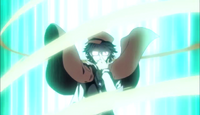
|
Manga Debut: | Chapter 6 |
|---|---|---|
| Anime Debut: | Episode 5 | |
| Ability: | Deduction |
Background
Ranpo was born somewhere outside Yokohama to two genius parents, namely the legendary detective known as the Clairvoyant and an equally intelligent housewife. He was raised in the countryside until their deaths when he then moved to Yokohama shortly afterward per his father’s suggestion. He soon attended the Yokohama Police Academy and lived in a dorm, where he found the strict rules to be a hassle. He soon ended up getting into an argument with the warden and exposed his past exploits with women, causing Ranpo to get kicked out of the academy.
Since then, Ranpo wandered around Yokohama, including living and landing a job at a military post, working at a construction site, and delivering mail. However, he eventually got expelled, as he exposed the military post chief’s embezzlement and disposed an unnecessary letter in the postal delivery; or left of his own accord, since he found the construction site’s corporate hierarchy to be quite bothersome.
At some point, Ranpo managed to secure an appointment interview with S&K Corporation as an apprentice office clerk. However, the company’s president was assassinated, so Ranpo settled to find a government-issued document for job searching somewhere in the president’s office to turn it in to the government and keep receiving financial aid and information. During this time, he encountered Fukuzawa, the bodyguard hired to protect the company president; Ranpo also met the president’s secretary, whom he easily deduced was the actual killer instead of the suspect, identified as the boy assassin Sakunosuke Oda, «caught» and detained in the other room.
Ranpo vents out at Fukuzawa about the strangeness of society and the adult world.
Eventually, Fukuzawa took Ranpo with him and treated him to a café. From then on, with nowhere to go, Ranpo sought Fukuzawa’s help, who decided to bring him to his next assignment at Theatrum Mundi, where a mysterious «V» had delivered a death threat. Ultimately, after Ranpo vented out his fear and bewilderment towards the «strange» world, Fukuzawa persuaded that he was an ability user who could see the truth in a single glance and gave him a random pair of glasses to «control» such ability. Realizing that he was indeed special rather than alien to others, Ranpo solved the theater case, which he deemed to be a trifle compared to a bigger one.
This latter case led him to Jun Mitamura, a member of V, who attempted to scout Ranpo into their organization of ability users bent on getting rid of other ability users. Ranpo declined his offer, and Fukuzawa arrived in time to rescue him. Subsequently, Ranpo and Fukuzawa formed a partnership and were requested by various clients for their services. Sometime later, at Fukuzawa’s behest, Ranpo located Sōseki Natsume, a man rumored to hold connections throughout Yokohama who helped them secure a Skilled Business Permit. Fukuzawa then used this to establish the Armed Detective Agency, where Ranpo became its first member.[2]
Battles
- Main article: List of Battles
The Guild Aftermath Arc
Cannibalism Arc
Appearances
Manga Appearances
Chapters in order of appearance
Port Mafia Arc
- Chapter 1 — Looking the Gift Tiger in the Mouth
- Chapter 5 — The Fatalist’s Sorrow
- Chapter 6 — Murder on D Street
- Chapter 7 — Kill A Man and Die Thee Too, Part 1
- Chapter 10 — Detective Boys
- Chapter 11 — Back in the Day… (flashback)
- Chapter 13 — The Rupturous Detective Agency
The Guild Arc
- Chapter 19 — The Three-Way Battle
- Chapter 21 — The Brother and the Devil
- Chapter 22 — The Strategy of Conflict
- Chapter 32 — Poe and Ranpo
- Chapter 33 — A White Whale, into the Oceans of Heaven
- Chapter 35 — Rashomon, the Tiger and the Last Tycoon (flashback)
- Chapter 36 — If I May Lay Down This Burden Today
- Chapter 37 — Closing the Party
The Guild Aftermath Arc
- Chapter 38 — Slap the Stick
- Chapter 39 — Portrait of a Father
- Chapter 40 — Walking Alone
- Chapter 45 — Fix it, Master Craft
Cannibalism Arc
- Chapter 47 — Mutual Destruction, Part 1
- Chapter 49 — Mutual Destruction, Part 3
- Chapter 53 — Echo, Part 3
Perfect Crime Arc
- Chapter 54 — The Perfect Murder, The Perfect Killer, Part 1
- Chapter 55 — The Perfect Murder, The Perfect Killer, Part 2
- Chapter 56 — The Perfect Murder, The Perfect Killer, Part 3
Hunting Dogs Arc
- Chapter 57 — Sunday Tragedy, Part 1
- Chapter 58 — Sunday Tragedy, Part 2
- Chapter 59 — Dogs Hunt Dogs, Part 1
- Chapter 64 — You and I, Children of Sin]] (flashback)
- Chapter 66 — Dreaming of Butterflies, Part 2 (flashback)
Sky Casino Arc
- Chapter 69 — The Escape (flashback)
- Chapter 78 — To Threaten God, Part 1 (image)
Kamui Revelation Arc
- Chapter 80 — The Strongest Man, Part 1
- Chapter 81 — The Strongest Man, Part 2
- Chapter 82 — The Greatest Conspirator
- Chapter 83 — Toward the Complete Answer, Part 1
- Chapter 83.5 — Toward the Complete Answer, Part 2
- Chapter 88 — As If Hurtling Downward (mentioned)
Vampire Infection Outbreak Arc
- Chapter 89 — Hero War, Gang War (cover)
- Chapter 91 — At the Detective Agency Anew
- Chapter 92 — At the Portway to the Sky, Part 1
- Chapter 92.5 — At the Portway to the Sky, Part 2
- Chapter 94 — At the Portway to the Sky, Part 4
- Chapter 94.5 — At the Portway to the Sky, Part 4.5
- Chapter 95 — At the Portway to the Sky, Part 5
Anime Appearances
Episodes in order of appearance
Manga Appearances
Chapters in order of appearance
- Chapter 1
Quotes
- (To Yukichi Fukuzawa) «So that one time… And that other time… All the pain I’ve suffered… But when you put it that way… I see… I see… So that’s why. Nobody hates me. […] Ha-ha-ha… Ha-ha-ha-ha! Ha-ha-ha-ha-ha! It all makes sense! So everyone is just a big baby! Well, of course they are! The world isn’t a disgusting place! Not at all! It’s just a simple, stupid place! Looks like I’ve gotta protect these stupid toddlers myself!«[2]
- (To Yukichi Fukuzawa and Jun Mitamura) «The reason I’m special is because I’m an ability user. Do you really think it would be possible for me to see things that others don’t, otherwise?«[2]
- «The city police are as lacking as ever, I see. They would never catch a single criminal without my support. My Super Deduction ability is the best in this Agency…no, the entire country! No wonder they rely on me so much!«[11]
- (To Minoura) «Huhh? You still don’t get it, do you? Master detectives don’t ‘investigate’. Once I trigger my Super Deduction ability, I’ll immediately know the who, the when, and the how! And not only that, I’ll know where the evidence is and how to make the killer confess, like a divine revelation!«[11]
- (To Ukai) «What are you, stupid? Sorry, that sounds rude as a question… Boy, you sure are stupid!«
- (To Mushitarō Oguri) «Mushitarō-kun, you’ve won! I knew from the start that regular people can’t defeat ability users. But I’m still going to defeat you. Why? Because my friends think I’m invincible.«[1]
- (After the Yokohama fog incident) «I don’t have an ability, and I’m back now, so I guess everything worked out.«[16][24]
- (To Mushitarō Oguri) «The Agency has fallen to Dostoevsky once. It won’t lose again. I won’t let him hurt a single person there. For that reason, I sat down, learned his ways, and took in the Conjurer himself.»[1]
- (To Mushitarō Oguri about Fyodor Dostoevsky) «There is no deduction behind this. This is the Conjurer’s mind control eating its way into your soul. It’s my new weapon—the power to kill ‘detective killers’.«[1]
- (To Yukichi Fukuzawa) «Am I not a great detective? And what a great detective does is one thing! Solving cases!«[9]
Etymology
- The name Ranpo is a pun on the name «-lan Poe»; the kanji used means «riot» (乱) (ran) and «walk» (歩) (ho/po).
- The surname Edogawa is a pun on the name «Edgar Allan»; the kanji used means «creek» (江) (e), «door» (戸) (to), and «river» (川) (kawa/gawa).
Namesake
- Main article: Real-life References#Ranpo Edogawa
- Arguably, the greatest figure in Japanese mystery fiction. Many of Edogawa’s characters — such as the detective Kogorou Akechi, the Boys’ Detective Club, and the Fiend with Twenty Faces — remain popular. His mysteries often lean more toward the occult, owing to his fondness for Edgar Allan Poe — in fact, his pen name is a play on the famous America author («Edgar Allan Poe» → «Edoga Waran Po»).[25]
Trivia
- The real-life Ranpo Edogawa‘s birthname is Hirai Tarō (平井 太郎).
- His author counterpart played a significant role in developing Japanese mystery fiction. His pen name Edogawa Ranpo is a pun on Edgar Allan Poe, whom he admired.[26] This admiration is inverted in the series.
- Ranpo, along with Doppo Kunikida, have abilities whose ability name is not a reference to a work of the author they are named after.
- Though Ranpo’s father is never named, both his job as a detective and the famous cases he has solved[2] imply that he may have been inspired by Kogorō Akechi, the detective whom Ranpo Edogawa often focused his detective fiction around.[27]
- According to the second official guidebook:[28]
- He spends his leisure time these days by going to Poe’s house, eating some candy, and going home.
- His average bedtime and waking time: «I don’t have a specific time, but I usually go to bed at 9pm and wake up at 7am.»
- My honest thoughts when I found out I wasn’t an ability-user: «I was trying not to notice…»
- Ranpo seems to be unable to sleep if it is pitch black.[29]
Notes
- ↑ Studio BONES changes his eye color to green in the anime adaptation.
References
- ↑ 1.0 1.1 1.2 1.3 1.4 1.5 1.6
Bungo Stray Dogs Manga: Chapter 56. - ↑ 2.0 2.1 2.2 2.3 2.4 2.5 2.6 2.7 2.8 2.9
Bungo Stray Dogs: The Untold Origins of the Detective Agency. - ↑ 3.0 3.1 3.2 3.3 3.4
Bungo Stray Dogs Manga: Chapter 32. - ↑
Bungo Stray Dogs: 55 Minutes. - ↑ 5.0 5.1 5.2 5.3 5.4 5.5 5.6
Bungo Stray Dogs Manga: Volume 3. - ↑
Bungo Stray Dogs Manga: Chapter 66. - ↑
Bungo Stray Dogs Manga: Chapter 53. - ↑ 8.0 8.1 8.2
Bungo Stray Dogs Manga: Chapter 54. - ↑ 9.0 9.1 9.2 9.3 9.4 9.5
Bungo Stray Dogs Manga: Chapter 80. - ↑ 10.0 10.1
Bungo Stray Dogs Manga: Chapter 79. - ↑ 11.0 11.1 11.2 11.3
Bungo Stray Dogs Manga: Chapter 6. - ↑
Bungo Stray Dogs: Osamu Dazai’s Entrance Exam. - ↑
Bungo Stray Dogs Manga: Chapter 10. - ↑ 14.0 14.1
Bungo Stray Dogs Manga: Chapter 47. - ↑
Bungo Stray Dogs Manga: Chapter 48. - ↑ 16.0 16.1
Bungo Stray Dogs: DEAD APPLE (Film). - ↑
Bungo Stray Dogs Manga: Chapter 69. - ↑
Bungo Stray Dogs Manga: Chapter 49. - ↑
Bungo Stray Dogs Manga: Chapter 55. - ↑
Bungo Stray Dogs Manga: Chapter 57. - ↑ 21.0 21.1
Bungo Stray Dogs Manga: Chapter 13. - ↑
Bungo Stray Dogs Manga: Chapter 81. - ↑
Bungo Stray Dogs Manga: Chapter 88. - ↑
Bungo Stray Dogs: DEAD APPLE (Light Novel). - ↑
Bungo Stray Dogs Manga: Volume 5,
Author Guide.
- ↑ Edogawa Ranpo. Wikipedia.
- ↑ Kogoro Akechi. Wikipedia.
- ↑
Bungo Stray Dogs Official Guidebook Shinkaroku. - ↑ Bungo Stray Dogs Drama CD: Welcome to Hot Springs.
Site Navigation
| Armed Detective Agency | |
|---|---|
| Leader | Yukichi Fukuzawa |
| Members | Akiko Yosano · Atsushi Nakajima · Doppo Kunikida · Jun’ichirō Tanizaki · Kenji Miyazawa · Kyōka Izumi · Osamu Dazai · Ranpo Edogawa |
| Clerks | Naomi Tanizaki · Kirako Haruno |
| Former | Katai Tayama |
«Mushitarō-kun, you’ve won! I knew from the start that regular people can’t defeat ability users. But I’m still going to defeat you. Why? Because my friends think I’m invincible.«
— Ranpo Edogawa to Mushitarō Oguri.[1]
Ranpo Edogawa (
Appearance
Ranpo is a young man with a fair complexion and short, messy black hair. His eyes, which are closed most of the time, are brown.[note 1]
His attire consists of a brown inverness cape that he wears over his shoulders and whose color matches both his hat and his pants. Under that, he wears a dark grey blazer and a white button-up with a light and dark blue striped tie. Under his three-quarter length pants, he wears long white socks that cover the visible part of his legs, and simple black shoes.
When he was young, Ranpo wears a gakuran with matching student cap and coat, with old-fashioned flat satchel hurng around his waist. When he chooses to activate his «ability», he will put on black glasses which were given to him by Yukichi Fukuzawa.[2]
After the agency’s founding, Ranpo wears simple white long sleeves with checkered tie and a pair of dark trousers.[6]
After the cannibalism, Ranpo wears a white long-sleeved shirt and a sleeveless vest suit together with a black ribbon tie.[7]
After defying Fukuzawa’s orders during the virus ordeal, Ranpo is told to help a sales staff at one of their client’s shopping mall, hence him putting a teddy bear costume.[8]
During the Agency’s frameup, Ranpo borrows a cloak from man and his boater hat as a distraction to get away from the military police.[9] Ranpo also wears a disguise in order to get Doppo Kunikida and Fukuzawa out from detainment, consisting of black overalls and a gas mask.[10] In rescuing Akiko Yosano from her execution, Ranpo wears the same outfit, albeit without the gas mask.[9]
Young Ranpo
Young Ranpo (Anime)
Ranpo’s attire after the agency’s founding
Ranpo wearing a kimono in Poe’s novel
Ranpo’s attire after cannibalism
Ranpo wears a teddy bear costume
Ranpo’s attire to distract the military police
Ranpo’s disguise to rescue Fukuzawa
Others
Wan! appearance
Wan! appearance — preschool
Personality
Ranpo’s carefree behavior.
Ranpo takes extreme pride in his «ability» which can solve any mystery in mere seconds, with which he has solved countless cases. With his incredible intelligence, he is commended for it by the rest of the Armed Detective Agency, even more so because he lacks an ability. He is often found bragging about his status as the greatest detective in the world.[11] Ranpo is also shown to be rather childish, frequently teasing the other detectives in the Agency and sometimes refusing to do work or cases for trivial reasons such as laziness or spite.[12][13] Ranpo has been shown to be unable to complete simple tasks such as riding a train or finding his way home when not utilizing Super Deduction.[11]
Ranpo showing his serious resolve when his friends are in danger.
However, despite this demeanor, Ranpo becomes serious and calm when the situation calls for it.[3][14] Atsushi Nakajima once noted Ranpo’s serious façade when devising their plan in protecting the virus-stricken Fukuzawa, an expression he admitted he has never seen before in the great detective. One of his long-time colleagues, Yosano, also understood Ranpo’s grave concern for the President when placed in trouble.
Ranpo’s conviction stems from his resolve to save his friends.
Because of the Agency’s faith in him, Ranpo equally places his trust in them.[14][15] He recognizes how the Agency members, whom he regards as his friends, see him as invincible, so Ranpo has a sense of conviction to protect them and vowed never to let anyone hurt them.[1] This rings true most especially after the events of Cannibalism: Ranpo admits his failure to catch Fyodor Dostoevsky, which might have prevented a child’s death and consequently Kunikida’s arrest.[8] During such cases, Ranpo does acknowledge that he has limitations himself, but he is nonetheless more than willing to perform any plausible means to solve the situation.
Notably, even though his colleagues seem to think that he is completely oblivious to the fact that he is not an ability user, he is aware that his Super Deduction is in fact not an ability. However, since the Agency puts so much faith into him, he initially refused to openly admit this to anyone in the Agency, as he refused to believe Fukuzawa when the latter straightforwardly told Ranpo that he is not actually an ability user[2] and seemed to dance around the topic with Yosano,[3] yet he outright admitted his lack of ability after the Yokohama fog incident caused by Tatsuhiko Shibusawa[16] and later to Mushitarō Oguri.
Admitting that he took in Fyodor’s methods in himself, Ranpo vows never to let anyone hurt the Agency.
With his vision and desire not to lose to Fyodor nor to anyone again, Ranpo carefully learned Fyodor’s ways and willingly took in the Conjurer himself, illustrating Ranpo’s exceptional resolve to do anything that he can for the sake of protecting the Agency. He claimed that such intimidation surpasses that of a typical deduction skill, which can defeat even detective killers and evidence suppressors—the great detective’s weaknesses—like Mushitarō.[1] He even put up a contingency plan to ensure that the Agency would be given all the help they need, especially from Mushitarō, in their battle against the Decay of the Angel, as he threatened to expose Mushitarō’s friend’s legacy to the public that might defame the late author.[17]
Ranpo offers his help to Poe, who was once his rival.
In addition, Ranpo has a certain kind of charisma that plants an apparent change in his former adversaries into people who aid him subsequently in different manners. One notable example is Edgar Allan Poe, once his sworn rival whom Ranpo defeated in a deduction battle six years ago,[3] who gradually becomes one of Ranpo’s trusted allies in his later pursuits and cases, such as the Cannibalism strategy,[18] its aftermath,[8][19][1] and in rescuing Agency members and affiliates during their frameup.[10][9] Another is Mushitarō himself, who prides himself as the infallible detective killer who challenged Ranpo but later warned the great detective of the Decay of the Angel’ threat out of his own volition.[20]
Ranpo convinces the police to rethink their perception on the wanted Agency.
Minoura, a police officer who initially doubted Ranpo’s detective skills, eventually sought his occasional help[21] and later broke him out from arrest[22] together with 30% of Yokohama’s police force.[23] Through his words of persuasion, Ranpo was able to turn such percentage of the military police into believers in the Agency despite being a wanted terrorist at the time.[9]
Ranpo also appears to have a great memory, as he is able to remember his duel with Poe from six years ago and identify Minoura as the «man whose subordinate he arrested».[21] In his 12 years of solving baffling cases as a detective, he seems to remember some of his clients, as hinted when he turned to a specific police officer out of the many arresting him, whom he possibly recognized to have helped out some time in the past.[9]
Ability
- Main article: Super Deduction
His uncanny aptitude, self-named «Super Deduction« (
His ability seems to not only be applicable to crime scenes but to other scenarios as well. When Ranpo decides to activate his «ability,» he will be able to find information and clues about a certain situation no matter how small, and with them instantaneously make extremely precise predictions. In fact, so far none of his deductions have been known to be erroneous or inaccurate.
This is shown when he easily solved the murder of Yamagiwa, which was deemed almost impossible by the police due to the severe lack of evidence.
Eventually, it is revealed that he is able to deduce everything simply due to his own extraordinary intelligence and that he does not possess an ability. Though he is not unaware of this fact, he initially denies it and continues to believe that he is an ability user. However, after some time, Ranpo has come to accept that he is a non-ability user, albeit occasionally still putting on his glasses to «activate» his ability and perform deductions.
| «Super Deduction« ( |
||

|
Manga Debut: | Chapter 6 |
|---|---|---|
| Anime Debut: | Episode 5 | |
| Ability: | Deduction |
Background
Ranpo was born somewhere outside Yokohama to two genius parents, namely the legendary detective known as the Clairvoyant and an equally intelligent housewife. He was raised in the countryside until their deaths when he then moved to Yokohama shortly afterward per his father’s suggestion. He soon attended the Yokohama Police Academy and lived in a dorm, where he found the strict rules to be a hassle. He soon ended up getting into an argument with the warden and exposed his past exploits with women, causing Ranpo to get kicked out of the academy.
Since then, Ranpo wandered around Yokohama, including living and landing a job at a military post, working at a construction site, and delivering mail. However, he eventually got expelled, as he exposed the military post chief’s embezzlement and disposed an unnecessary letter in the postal delivery; or left of his own accord, since he found the construction site’s corporate hierarchy to be quite bothersome.
At some point, Ranpo managed to secure an appointment interview with S&K Corporation as an apprentice office clerk. However, the company’s president was assassinated, so Ranpo settled to find a government-issued document for job searching somewhere in the president’s office to turn it in to the government and keep receiving financial aid and information. During this time, he encountered Fukuzawa, the bodyguard hired to protect the company president; Ranpo also met the president’s secretary, whom he easily deduced was the actual killer instead of the suspect, identified as the boy assassin Sakunosuke Oda, «caught» and detained in the other room.
Ranpo vents out at Fukuzawa about the strangeness of society and the adult world.
Eventually, Fukuzawa took Ranpo with him and treated him to a café. From then on, with nowhere to go, Ranpo sought Fukuzawa’s help, who decided to bring him to his next assignment at Theatrum Mundi, where a mysterious «V» had delivered a death threat. Ultimately, after Ranpo vented out his fear and bewilderment towards the «strange» world, Fukuzawa persuaded that he was an ability user who could see the truth in a single glance and gave him a random pair of glasses to «control» such ability. Realizing that he was indeed special rather than alien to others, Ranpo solved the theater case, which he deemed to be a trifle compared to a bigger one.
This latter case led him to Jun Mitamura, a member of V, who attempted to scout Ranpo into their organization of ability users bent on getting rid of other ability users. Ranpo declined his offer, and Fukuzawa arrived in time to rescue him. Subsequently, Ranpo and Fukuzawa formed a partnership and were requested by various clients for their services. Sometime later, at Fukuzawa’s behest, Ranpo located Sōseki Natsume, a man rumored to hold connections throughout Yokohama who helped them secure a Skilled Business Permit. Fukuzawa then used this to establish the Armed Detective Agency, where Ranpo became its first member.[2]
Battles
- Main article: List of Battles
The Guild Aftermath Arc
Cannibalism Arc
Appearances
Manga Appearances
Chapters in order of appearance
Port Mafia Arc
- Chapter 1 — Looking the Gift Tiger in the Mouth
- Chapter 5 — The Fatalist’s Sorrow
- Chapter 6 — Murder on D Street
- Chapter 7 — Kill A Man and Die Thee Too, Part 1
- Chapter 10 — Detective Boys
- Chapter 11 — Back in the Day… (flashback)
- Chapter 13 — The Rupturous Detective Agency
The Guild Arc
- Chapter 19 — The Three-Way Battle
- Chapter 21 — The Brother and the Devil
- Chapter 22 — The Strategy of Conflict
- Chapter 32 — Poe and Ranpo
- Chapter 33 — A White Whale, into the Oceans of Heaven
- Chapter 35 — Rashomon, the Tiger and the Last Tycoon (flashback)
- Chapter 36 — If I May Lay Down This Burden Today
- Chapter 37 — Closing the Party
The Guild Aftermath Arc
- Chapter 38 — Slap the Stick
- Chapter 39 — Portrait of a Father
- Chapter 40 — Walking Alone
- Chapter 45 — Fix it, Master Craft
Cannibalism Arc
- Chapter 47 — Mutual Destruction, Part 1
- Chapter 49 — Mutual Destruction, Part 3
- Chapter 53 — Echo, Part 3
Perfect Crime Arc
- Chapter 54 — The Perfect Murder, The Perfect Killer, Part 1
- Chapter 55 — The Perfect Murder, The Perfect Killer, Part 2
- Chapter 56 — The Perfect Murder, The Perfect Killer, Part 3
Hunting Dogs Arc
- Chapter 57 — Sunday Tragedy, Part 1
- Chapter 58 — Sunday Tragedy, Part 2
- Chapter 59 — Dogs Hunt Dogs, Part 1
- Chapter 64 — You and I, Children of Sin]] (flashback)
- Chapter 66 — Dreaming of Butterflies, Part 2 (flashback)
Sky Casino Arc
- Chapter 69 — The Escape (flashback)
- Chapter 78 — To Threaten God, Part 1 (image)
Kamui Revelation Arc
- Chapter 80 — The Strongest Man, Part 1
- Chapter 81 — The Strongest Man, Part 2
- Chapter 82 — The Greatest Conspirator
- Chapter 83 — Toward the Complete Answer, Part 1
- Chapter 83.5 — Toward the Complete Answer, Part 2
- Chapter 88 — As If Hurtling Downward (mentioned)
Vampire Infection Outbreak Arc
- Chapter 89 — Hero War, Gang War (cover)
- Chapter 91 — At the Detective Agency Anew
- Chapter 92 — At the Portway to the Sky, Part 1
- Chapter 92.5 — At the Portway to the Sky, Part 2
- Chapter 94 — At the Portway to the Sky, Part 4
- Chapter 94.5 — At the Portway to the Sky, Part 4.5
- Chapter 95 — At the Portway to the Sky, Part 5
Anime Appearances
Episodes in order of appearance
Manga Appearances
Chapters in order of appearance
- Chapter 1
Quotes
- (To Yukichi Fukuzawa) «So that one time… And that other time… All the pain I’ve suffered… But when you put it that way… I see… I see… So that’s why. Nobody hates me. […] Ha-ha-ha… Ha-ha-ha-ha! Ha-ha-ha-ha-ha! It all makes sense! So everyone is just a big baby! Well, of course they are! The world isn’t a disgusting place! Not at all! It’s just a simple, stupid place! Looks like I’ve gotta protect these stupid toddlers myself!«[2]
- (To Yukichi Fukuzawa and Jun Mitamura) «The reason I’m special is because I’m an ability user. Do you really think it would be possible for me to see things that others don’t, otherwise?«[2]
- «The city police are as lacking as ever, I see. They would never catch a single criminal without my support. My Super Deduction ability is the best in this Agency…no, the entire country! No wonder they rely on me so much!«[11]
- (To Minoura) «Huhh? You still don’t get it, do you? Master detectives don’t ‘investigate’. Once I trigger my Super Deduction ability, I’ll immediately know the who, the when, and the how! And not only that, I’ll know where the evidence is and how to make the killer confess, like a divine revelation!«[11]
- (To Ukai) «What are you, stupid? Sorry, that sounds rude as a question… Boy, you sure are stupid!«
- (To Mushitarō Oguri) «Mushitarō-kun, you’ve won! I knew from the start that regular people can’t defeat ability users. But I’m still going to defeat you. Why? Because my friends think I’m invincible.«[1]
- (After the Yokohama fog incident) «I don’t have an ability, and I’m back now, so I guess everything worked out.«[16][24]
- (To Mushitarō Oguri) «The Agency has fallen to Dostoevsky once. It won’t lose again. I won’t let him hurt a single person there. For that reason, I sat down, learned his ways, and took in the Conjurer himself.»[1]
- (To Mushitarō Oguri about Fyodor Dostoevsky) «There is no deduction behind this. This is the Conjurer’s mind control eating its way into your soul. It’s my new weapon—the power to kill ‘detective killers’.«[1]
- (To Yukichi Fukuzawa) «Am I not a great detective? And what a great detective does is one thing! Solving cases!«[9]
Etymology
- The name Ranpo is a pun on the name «-lan Poe»; the kanji used means «riot» (乱) (ran) and «walk» (歩) (ho/po).
- The surname Edogawa is a pun on the name «Edgar Allan»; the kanji used means «creek» (江) (e), «door» (戸) (to), and «river» (川) (kawa/gawa).
Namesake
- Main article: Real-life References#Ranpo Edogawa
- Arguably, the greatest figure in Japanese mystery fiction. Many of Edogawa’s characters — such as the detective Kogorou Akechi, the Boys’ Detective Club, and the Fiend with Twenty Faces — remain popular. His mysteries often lean more toward the occult, owing to his fondness for Edgar Allan Poe — in fact, his pen name is a play on the famous America author («Edgar Allan Poe» → «Edoga Waran Po»).[25]
Trivia
- The real-life Ranpo Edogawa‘s birthname is Hirai Tarō (平井 太郎).
- His author counterpart played a significant role in developing Japanese mystery fiction. His pen name Edogawa Ranpo is a pun on Edgar Allan Poe, whom he admired.[26] This admiration is inverted in the series.
- Ranpo, along with Doppo Kunikida, have abilities whose ability name is not a reference to a work of the author they are named after.
- Though Ranpo’s father is never named, both his job as a detective and the famous cases he has solved[2] imply that he may have been inspired by Kogorō Akechi, the detective whom Ranpo Edogawa often focused his detective fiction around.[27]
- According to the second official guidebook:[28]
- He spends his leisure time these days by going to Poe’s house, eating some candy, and going home.
- His average bedtime and waking time: «I don’t have a specific time, but I usually go to bed at 9pm and wake up at 7am.»
- My honest thoughts when I found out I wasn’t an ability-user: «I was trying not to notice…»
- Ranpo seems to be unable to sleep if it is pitch black.[29]
Notes
- ↑ Studio BONES changes his eye color to green in the anime adaptation.
References
- ↑ 1.0 1.1 1.2 1.3 1.4 1.5 1.6
Bungo Stray Dogs Manga: Chapter 56. - ↑ 2.0 2.1 2.2 2.3 2.4 2.5 2.6 2.7 2.8 2.9
Bungo Stray Dogs: The Untold Origins of the Detective Agency. - ↑ 3.0 3.1 3.2 3.3 3.4
Bungo Stray Dogs Manga: Chapter 32. - ↑
Bungo Stray Dogs: 55 Minutes. - ↑ 5.0 5.1 5.2 5.3 5.4 5.5 5.6
Bungo Stray Dogs Manga: Volume 3. - ↑
Bungo Stray Dogs Manga: Chapter 66. - ↑
Bungo Stray Dogs Manga: Chapter 53. - ↑ 8.0 8.1 8.2
Bungo Stray Dogs Manga: Chapter 54. - ↑ 9.0 9.1 9.2 9.3 9.4 9.5
Bungo Stray Dogs Manga: Chapter 80. - ↑ 10.0 10.1
Bungo Stray Dogs Manga: Chapter 79. - ↑ 11.0 11.1 11.2 11.3
Bungo Stray Dogs Manga: Chapter 6. - ↑
Bungo Stray Dogs: Osamu Dazai’s Entrance Exam. - ↑
Bungo Stray Dogs Manga: Chapter 10. - ↑ 14.0 14.1
Bungo Stray Dogs Manga: Chapter 47. - ↑
Bungo Stray Dogs Manga: Chapter 48. - ↑ 16.0 16.1
Bungo Stray Dogs: DEAD APPLE (Film). - ↑
Bungo Stray Dogs Manga: Chapter 69. - ↑
Bungo Stray Dogs Manga: Chapter 49. - ↑
Bungo Stray Dogs Manga: Chapter 55. - ↑
Bungo Stray Dogs Manga: Chapter 57. - ↑ 21.0 21.1
Bungo Stray Dogs Manga: Chapter 13. - ↑
Bungo Stray Dogs Manga: Chapter 81. - ↑
Bungo Stray Dogs Manga: Chapter 88. - ↑
Bungo Stray Dogs: DEAD APPLE (Light Novel). - ↑
Bungo Stray Dogs Manga: Volume 5,
Author Guide.
- ↑ Edogawa Ranpo. Wikipedia.
- ↑ Kogoro Akechi. Wikipedia.
- ↑
Bungo Stray Dogs Official Guidebook Shinkaroku. - ↑ Bungo Stray Dogs Drama CD: Welcome to Hot Springs.
Site Navigation
| Armed Detective Agency | |
|---|---|
| Leader | Yukichi Fukuzawa |
| Members | Akiko Yosano · Atsushi Nakajima · Doppo Kunikida · Jun’ichirō Tanizaki · Kenji Miyazawa · Kyōka Izumi · Osamu Dazai · Ranpo Edogawa |
| Clerks | Naomi Tanizaki · Kirako Haruno |
| Former | Katai Tayama |


